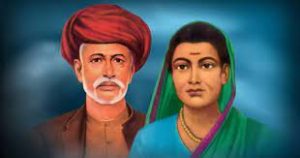Savitribai And Jyotirao Phule:

Maharashtra Governor Bhagat Singh Koshyari has recently received flak for his remarks on the social reformist couple Jyotirao and Savitribai Phule.
- He said in a video, “Savitribai was married off at the age of 10 and her husband was 13 years old at that time.
- Now think about it, what must girls and boys be thinking after getting married”.
Savitribhai Phule:
- Born in Naigaon in Maharashtra on January 3, 1831, Phule is widely regarded as one of India’s first generation modern feminists for her significant contributions in ensuring equal education opportunities under the British raj.
- She became the first female teacher in India in 1848 and opened a school for girls along with her husband, social reformer Jyotirao Phule.
- The two also worked against discrimination based on caste-based identity, something vehemently opposed by the orthodox sections of society in Pune.
- The couple set up ‘Balyata Pratibandak Gruha’, a childcare centre for the protection of pregnant widows and rape victims.
- Phule also played a pivotal role in directing the work of the Satyashodhak Samaj, formed by her husband with the objective to achieve equal rights for the marginalised lower castes.
- As an extension, they started, ‘Satya Shodhaka Marriage’ where the marrying couple has to take a pledge to promote education and equality.
- Savitribai opened a clinic in 1897 for victims of the bubonic plague that spread across Maharashtra just before the turn of the century.
- She also set up “Balhatya Pratibandhak Griha”.
- She organised a boycott by barbers against the tradition of head tonsuring of widows.
- In her honour, University of Pune was renamed Savitribai Phule University in 2015.
About Jyotirao Phule:
- Born in 1827 in Satara district of Maharashtra.
- Phule was given the title of Mahatma on May 11, 1888, by Vithalrao Krishnaji Vandekar, a Maharashtrian social activist.
- His famous works: Tritiya Ratna (1855), Gulamgiri (1873), Shetkarayacha Aasud, or Cultivator’s Whipcord (1881), Satyashodhak Samajokt Mangalashtakasah Sarva Puja-vidhi (1887).




